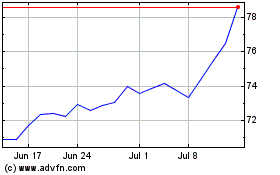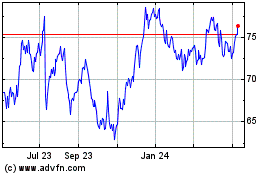By Dawn Lim
Money managers that mimic the stock market just became the new
titans of the fund-management world.
Funds that track broad U.S. equity indexes hit $4.27 trillion in
assets as of Aug. 31, according to research firm Morningstar Inc.,
giving them more money than stock-picking rivals for the first-ever
monthly reporting period. Funds that try to beat the market had
$4.25 trillion as of that date.
The passing of the asset crown is the latest chapter in one of
the most dramatic transformations in the history of financial
markets. In the past decade, $1.32 trillion fled actively managed
U.S. equity mutual funds and exchange-traded funds as nearly $1.36
trillion was added to low-cost funds that mimic market indexes.
That shift lowered the price of investing for individuals,
reduced the influence of stock pickers and turned a handful of Wall
Street outsiders into the biggest power brokers in the
industry.
Indexing giants such as BlackRock Inc., Vanguard Group and State
Street Corp. now wield considerable power over corporate America
and can cast pivotal votes that determine everything from who sits
on a company board to how executives deal with issues ranging from
climate change to pay equity.
The rise of indexing has attracted scrutiny from those who are
worried market-mimicking funds could distort prices and exacerbate
market turbulence. Index giants have so far dismissed those
concerns as fear mongering as they continue to grow.
"Let's first define when people talk about indexing getting
big," Vanguard Chief Executive Tim Buckley said in May. "It's not
big enough. There's still too many people getting ripped off by
high-cost active."
The Morningstar data covers a slice of the mutual fund and ETF
world focused on U.S. equities. Industry trade group Investment
Company Institute said its own data showed assets in U.S. equity
index mutual funds and ETFs haven't surpassed actively managed U.S.
stock funds.
Index funds are a long way from dominating the whole stock
market. U.S.-focused index equity funds make up nearly 14% of the
American stock market, up from roughly 7% in 2010, according to the
Investment Company Institute. Index funds generally contribute up
to 5% of U.S. stock-market trading, economists estimate.
Old-fashioned money managers aren't willing to relinquish their
crown so easily. They are experimenting with new fee structures,
leaning more heavily on data science and turning to illiquid bets
in a bid to keep customers and attract new ones. Some also are
using index funds to build their portfolios.
"I look at it much in the same way as Roger Federer looks at
Novak Djokovic," said Andreas Utermann, chief executive of Allianz
Global Investors, in a nod to two tennis titans. "It helps us to
improve our game."
The challenge to traditional stock pickers began more than four
decades ago with Vanguard founder Jack Bogle's introduction of the
first index mutual fund for ordinary investors in 1976. His idea,
which was to allow everyday investors to essentially own a stake in
the entire market at minimal cost, was initially scorned by Wall
Street.
Another threat emerged in the 1990s with the advent of
exchange-traded funds. These are collections of stocks or bonds
that trade on exchanges and give investors rapid exposure to
markets.
Following the 2008 financial crisis, more customers pulled their
money from actively managed funds when they realized pricier
managers had failed to protect them from the market rout. The
outflows snowballed as stock pickers struggled to beat one of the
longest bull runs in history. More than 80% of U.S. actively
managed equity funds underperformed the S&P Composite 1500 in
the decade ended 2018, according to S&P Global.
Three firms -- BlackRock, Vanguard and State Street -- were
major beneficiaries of the shift, cementing a roughly 80% share of
the index fund market. BlackRock and Vanguard collectively took in
a daily average of roughly a billion dollars in total net flows
last year. State Street's SPDR S&P 500 ETF Trust was one of the
most-traded securities in the past year.
These firms face new questions as their power intensifies. One
is how they should wield their newfound influence over companies.
BlackRock, Vanguard and State Street hold about 20% of the S&P
500 through funds they manage, according to FactSet. Big indexers
were key votes in a landmark shareholder victory in 2017 that
pushed oil giant Exxon Mobil Corp. to explain the impact of
climate-change rules.
"The rise of passive investing raises the corporate governance
challenge of the 21st century," said Securities and Exchange
Commission Commissioner Robert Jackson in a statement. "It can give
a few individuals influence over the outcome of elections in the
corporations that control the economic future of millions of
American families."
Others question if index funds are equipped to watch over all
the companies in which they invest. "They have driven real
governance improvements," said Lyndon Park, who heads a business at
ICR that advises companies on shareholders. "But given the large
universe they invest in, their stewardship teams can't follow every
company and sector-specific issue." Indexing managers from
BlackRock to Vanguard have been expanding their stewardship teams
in recent years.
Lynn Blake, who heads equity indexing at State Street Global
Advisors, adds that the firm has to be selective about which
companies it meets and that it uses technology to augment the reach
of its 12-person stewardship team. "We will hold positions for a
very long time," she said. "We want to work closely with directors
and boards so they understand our point of view."
Another concern is the ripple effect index funds have on the
stock market. Some studies show that company share prices get a
boost when they are added to major benchmarks, and stocks can be
vulnerable to short-term price swings as money moves in and out of
index ETFs, especially for shares that are bigger parts of indexes
and less traded.
Asset managers that run index funds say fears that the strategy
could cause widespread market disruptions are overblown. There are
hundreds of index products and they don't all trade in tandem.
Moreover, buying and selling by index funds reflects real shifts in
sentiment by investors, and stock prices should respond regardless
of what kind of fund is used.
But the apostle of the index fund became more concerned about
the unintended consequences of indexing's success in his final
years. If index giants kept growing at the same clip, it would be a
matter of time before governments tried to break them up, the late
Mr. Bogle told close associates. He worried this would put the
future of the index fund in jeopardy.
--Jason Zweig contributed to this article.
Write to Dawn Lim at dawn.lim@wsj.com
(END) Dow Jones Newswires
September 18, 2019 05:44 ET (09:44 GMT)
Copyright (c) 2019 Dow Jones & Company, Inc.
State Street (NYSE:STT)
Historical Stock Chart
From Mar 2024 to Apr 2024

State Street (NYSE:STT)
Historical Stock Chart
From Apr 2023 to Apr 2024
